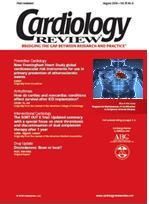Publication
Article
Cardiology Review® Online
A middle-aged patient with prehypertension and moderate alcohol consumption
A 45-year-old white, male, freelance photographer of French ancestry underwent a routine annual physical examination.
A 45-year-old white, male, freelance photographer of French ancestry underwent a routine annual physical examination. He had a history of prehypertension, with previous blood pressures ranging from 110/70 mm Hg to 130/85 mm Hg over a decade. He was a nonsmoker, did not use drugs, and had no known history of problem drinking, consuming 1 to 2 beers or 2 to 3 glasses of wine with dinner most days of the week, with a maximum of 3 to 4 beers on occasion within the previous year. He had a long history of nevi, 2 of which had been removed and were shown to be benign. He also had chronic allergic rhinitis, which was treated with nasal steroids and desensitization in the past, with few symptoms currently. He did not use drugs, rarely took acetaminophen, and had no symptoms.
The patient ran 3 to 6 miles per day without difficulty and rode his bicycle extensively. Results of a screening colonoscopy performed 10 years earlier were negative. He had gained approximately 10 to 15 pounds over the past 5 to 10 years. He had a total cholesterol (TC) level of 182 mg/dL, a high-density lipoprotein cholesterol (HDL-C) level of 53 mg/dL, and a TC/HDL-C ratio of 3.4. He had a broad diet, used no added salt, and ate most meals at home.
The patient was married to a teacher and had no children. His father died at 44 years of age from colon cancer. His mother was still alive at age 72. He had 2 younger brothers who were well.
Physical examination showed a blood pressure of 146/84 mm Hg, a resting heart rate of 65 beats/minute, a weight of 179 pounds, and a body mass index of 26.2 kg/m2. The patient looked well, appeared his stated age, and was alert and engaging. Results of the lymphatic, head, eyes, ear, nose, and throat examinations were normal. Both lungs were clear on auscultation. The patient had a regular heart rate with no murmurs, rubs, or gallops, and there was no jugular venous distention or carotid, femoral, or abdominal bruits. Examination of the abdomen, genitourinary system, and extremities was normal. He had innumerable stable but complex back nevi.
The patient was concerned about his blood pressure. A review of his diet indicated that he was already following most of the Dietary Approaches to Stop Hypertension (DASH) recommendations, although his portion sizes had grown over the past several years. He planned to attempt weight reduction. For social and cultural reasons, he was reluctant to alter his alcohol intake, but wondered whether it would be advisable, given his elevated systolic blood pressure and longstanding hypertension. How would you advise him?






